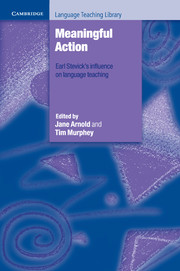Book contents
- Frontmatter
- Contents
- List of contributors
- Acknowledgements
- Preface
- Introduction
- Part A Meaning-making inside and between the people in the classroom
- Part B Meaningful classroom activity
- Part C Frameworks for meaningful language learning
- Epilogue: A way with words – perspectives on the contributions and influence of Earl W. Stevick
- Appendix: Words of tribute to Earl Stevick
- Index
16 - From language learner to learning advisor
Published online by Cambridge University Press: 15 November 2023
- Frontmatter
- Contents
- List of contributors
- Acknowledgements
- Preface
- Introduction
- Part A Meaning-making inside and between the people in the classroom
- Part B Meaningful classroom activity
- Part C Frameworks for meaningful language learning
- Epilogue: A way with words – perspectives on the contributions and influence of Earl W. Stevick
- Appendix: Words of tribute to Earl Stevick
- Index
Summary
Introduction
This is the story of a journey, less of geography than mind. It begins before I learned my first foreign language – Latin – and continues through my insights about learning to helping others succeed at the demanding task of reaching high levels of proficiency in the foreign languages taught to members of the US foreign affairs community.
The culmination of the journey is the establishment of the Foreign Service Institute's (FSI) Learning Consultation Service, an advisory learning programme to assist the educated, adult (average age around 40) and often highly driven students of the FSI intensive language programmes. The narrative is a chronological description of insights and experiences that led me to found this now well-established programme. It is followed by a description of the Consultation Service and of important lessons I have learned over the course of my career, many of which were influenced by my association with Earl Stevick while he was at the FSI.
Personal narrative
There is considerable work to show how a single case history can serve as the source of useful insights and raise questions for future research. Narratives help us generalize. Researchers have pointed out that ‘showing concrete details of a specific life can convey a general way of life’ (Ellis 1998: 1) and that ‘it is valid and effective to draw on personal experiences … to explore a topic, as well as a prime source of data’ (Gaitan 2000: 9). Narratives can help make the abstract more concrete and thus more comprehensible. For example, Bruner (1996: 90) points out, ‘telling stories in order to understand is not mere enrichment of the mind; without them we are, to use [Kierkegaard’s] words, reduced to fear and trembling’. Another, less poetic, way to say it is that without stories and examples, we often have difficulty grasping abstractions, as useful as said abstractions may be. (See also Chapter 1 of this volume.)
In addition, narratives are rich in ways that experimental research reports cannot be. Pavlenko and Lantolf (2000: 161) state, ‘Most importantly, narrative-based theory and research also has ecological validity as that which “has something to say about what people do in real, culturally significant situations”’ (Neisser 1976: 2).
- Type
- Chapter
- Information
- Meaningful ActionEarl Stevick's Influence on Language Teaching, pp. 252 - 270Publisher: Cambridge University PressPrint publication year: 2013



